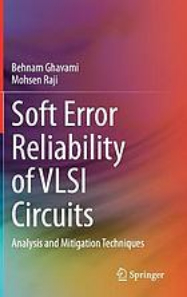Soft Error Reliability of VLSI Circuits Analysis and Mitigation Techniques
Material type: TextLanguage: English Publication details: Cham, Switzerland : Springer, c2021Description: XIII, 114 p. : illISBN:
TextLanguage: English Publication details: Cham, Switzerland : Springer, c2021Description: XIII, 114 p. : illISBN: - 9783030516093
- 621.3815 GHA
| Item type | Current library | Collection | Shelving location | Call number | Copy number | Status | Date due | Barcode |
|---|---|---|---|---|---|---|---|---|
 Lending Collection
Lending Collection
|
Circulation Section | Department of Electronic Engineering | Circulation Section | 621.3815 GHA | 2022-23 | Available | 97867 |
Behnam Ghavami was born in Esfarayen, Iran. He received his Ph.D. degree in computer engineering from Amirkabir University of Technology, Tehran, Iran. He has been serving as a Faculty Member with the Computer Engineering Department, Shahid Bahonar University of Kerman, since 2010, where he is currently Tenured Associate Professor. He teaches courses in design of digital systems, computer architecture, FPGA design, and reliable circuit design. He has supervised or co-supervised about 20 graduate students. He has published over 100 refereed papers. His research interests include the design automation of digital systems, robust logic designs, and FPGA-based design. He is currently an Associate Editor of the Journal of Electronic Testing-Springer and Microelectronics Journal-Elsevier. He has a decade of industry experience, including working on FPGA systems in industry.
Mohsen Raji received his Ph.D. degree in computer engineering from Amirkabir University of Technology, Tehran, Iran. He has been serving as an Assistant Professor in School of Electrical and Computer Engineering, Shiraz University, Shiraz, Iran, since 2015. He teaches courses such as VLSI systems design, microprocessors, embedded systems, fault tolerant system design. He has supervised or co-supervised about 10 graduate students and published over 30 refereed papers. He is serving as an associated editor of Iranian Journal of Science and Technology, Transactions of Electrical Engineering. His current research interests include dependable computing, reliable and robust logic designs, design automation of digital systems, and embedded systems.
Summary:
This book is intended for readers who are interested in the design of robust and reliable electronic digital systems. The authors cover emerging trends in design of today’s reliable electronic systems which are applicable to safety-critical applications, such as automotive or healthcare electronic systems. The emphasis is on modeling approaches and algorithms for analysis and mitigation of soft errors in nano-scale CMOS digital circuits, using techniques that are the cornerstone of Computer Aided Design (CAD) of reliable VLSI circuits. The authors introduce software tools for analysis and mitigation of soft errors in electronic systems, which can be integrated easily with design flows. In addition to discussing soft error aware analysis techniques for combinational logic, the authors also describe new soft error mitigation strategies targeting commercial digital circuits. Coverage includes novel Soft Error Rate (SER) analysis techniques such as process variation aware SER estimation and GPU accelerated SER analysis techniques, in addition to SER reduction methods such as gate sizing and logic restructuring based SER techniques.
